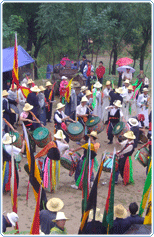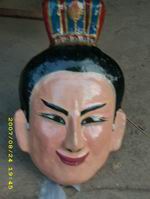About Nadun

|
 About
the source of Nadun, an interesting legend still spreads among the people
of the Tu nationality: long long ago, there was a carpenter of the Tu
nationality; he was summoned by the king to construct a palace because
of his outstanding technology and great fame. After the magnificent palace
was finished, the king unexpectedly ordered to execute all the craftsmen,
including the carpenter of the Tu nationality, because he wanted to solely
enjoy all good things in the world. About
the source of Nadun, an interesting legend still spreads among the people
of the Tu nationality: long long ago, there was a carpenter of the Tu
nationality; he was summoned by the king to construct a palace because
of his outstanding technology and great fame. After the magnificent palace
was finished, the king unexpectedly ordered to execute all the craftsmen,
including the carpenter of the Tu nationality, because he wanted to solely
enjoy all good things in the world.
 The
carpenter tried to flee back to hometown, and assembled the crowd and
started an uprising. The king assigned the army to suppress them. The
village people that were surrounded completely by the official army would
get drowned. At the critical juncture, the carpenter suddenly thought
out a good stratagem, and ordered all the people not to be flurried. They
beat the drums and gongs, and said that they were holding the activities
of celebrating harvest, and carried the war flags and painted weapons
on their shoulders to the temples in the village. The official army found
that all the people were calm and unhurried, and had no the sign of rebellion,
so they withdrew the troops and returned back. To memorize this quick-witted
and brave carpenter, the people began to hold the similar activities every
year after that, and it was passed down as a custom and developed to the
present Nadun. The
carpenter tried to flee back to hometown, and assembled the crowd and
started an uprising. The king assigned the army to suppress them. The
village people that were surrounded completely by the official army would
get drowned. At the critical juncture, the carpenter suddenly thought
out a good stratagem, and ordered all the people not to be flurried. They
beat the drums and gongs, and said that they were holding the activities
of celebrating harvest, and carried the war flags and painted weapons
on their shoulders to the temples in the village. The official army found
that all the people were calm and unhurried, and had no the sign of rebellion,
so they withdrew the troops and returned back. To memorize this quick-witted
and brave carpenter, the people began to hold the similar activities every
year after that, and it was passed down as a custom and developed to the
present Nadun.
|
| Turkish
Meaning |
"Nadun"
is the transliteration of the Tu nationality's  language,
and means "play", "entertainment" and "game",
etc. language,
and means "play", "entertainment" and "game",
etc.
Huishou:
the participant of Nadun
Bayi’er:
pleasant
Mani Wurang:
Buddhist holy land
Zaihang:
beautiful
Sanchuan:
in narrow sense, it means three places, including Zhaomuchuan, Zhongchuan,
Xiakou; in broad sense, it means Guanting, Zhongchuan, Qianhe, Manping,
Xing’er and Gangou.
Baogai:
long narrow flag
Fala: the embodiment
of God
|
|